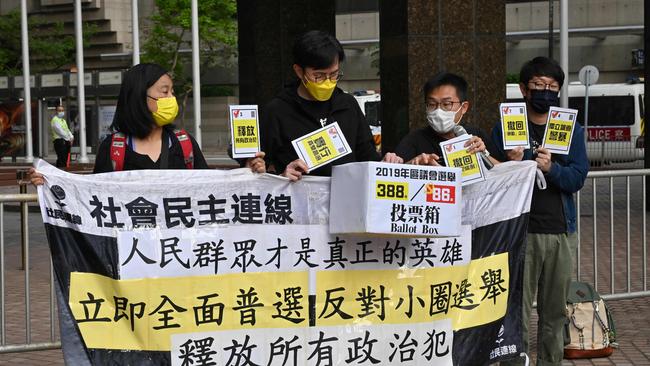Washington slaps on Hong Kong sanctions
A demonstration of the values-based policy Joe Biden believes will give the US a systemic advantage over Xi Jinping’s regime.

The US has imposed sanctions on 24 senior Chinese and Hong Kong government officials accused of undermining the former British colony’s political system.
US Secretary of State Antony Blinken announced the financial sanctions during a visit to Japan and South Korea, as the Biden administration shores up support of allies and partners before a high-level meeting with Chinese officials on Friday (AEST).
“Yesterday in Tokyo, Japan, I spoke of the need to stand up for our shared democratic values and to work together to hold to account those who would threaten them,” Mr Blinken said on Wednesday. “Today, we are again doing that.”
The sanctions are the latest demonstration of the values-based foreign policy the Biden administration believes will give it a systemic advantage over Chinese President Xi Jinping’s increasingly authoritarian regime.
In a keynote foreign policy speech, President Joe Biden last month said he would put democratic values at the centre of his administration’s diplomacy — a clear rupture from Donald Trump’s “America first” doctrine.
The sanctions were announced less than a week after the National People’s Congress — China’s biggest annual political gathering — instructed Hong Kong’s parliament to reform its electoral system.
All candidates in Hong Kong’s new political system will have to pass a Beijing-controlled vetting committee, as Mr Xi’s administration continues to clamp down on the city’s democracy movement. Beijing has said the changes were required to fix “loopholes” in the city’s government and ensure that it is governed by “patriots”.
“It is totally constitutional, lawful and justified,” said foreign ministry spokesman Zhao Lijian.
He said “a handful of countries viciously smeared” the changes and “flagrantly interfered in China’s domestic affairs”.
The new US sanctions apply to two dozen Chinese and Hong Kong officials, including the city’s chief executive Carrie Lam and politburo member Wang Chen.
Foreign financial institutions that “knowingly conduct significant transactions” with the targeted officials will also be subject to sanctions.
On Wednesday Mr Blinken and US Secretary of Defence Lloyd Austin met with their counterparts in South Korea after earlier “two-plus-two” talks in Japan.
Before flying out of Tokyo, Mr Blinken said the US was determined to work with Japan and other democracies to “stand up together for democratic values”.
“Democracy is under challenge and under threat in ways that it hasn’t been before, certainly not in recent years, particularly from autocratic countries on the rise,” he said.
Mr Blinken also criticised China’s “vaccine diplomacy”. “We shouldn’t tie the distribution or access to vaccines to politics or to geopolitics,” he said.
The actions and comments by the Biden administration indicate Friday’s meeting with Mr Blinken, National Security Adviser Jake Sullivan and China’s top diplomat Yang Jiechi and Foreign Minister Wang Yi in Alaska will be tense.
“Both sides believe they don’t have to concede and that time is on their side,” said Wu Qiang, a former political lecturer at Beijing’s prestigious Tsinghua University.
“Their confrontation shows no sign of relief in the foreseeable future,” he told The Australian.




To join the conversation, please log in. Don't have an account? Register
Join the conversation, you are commenting as Logout